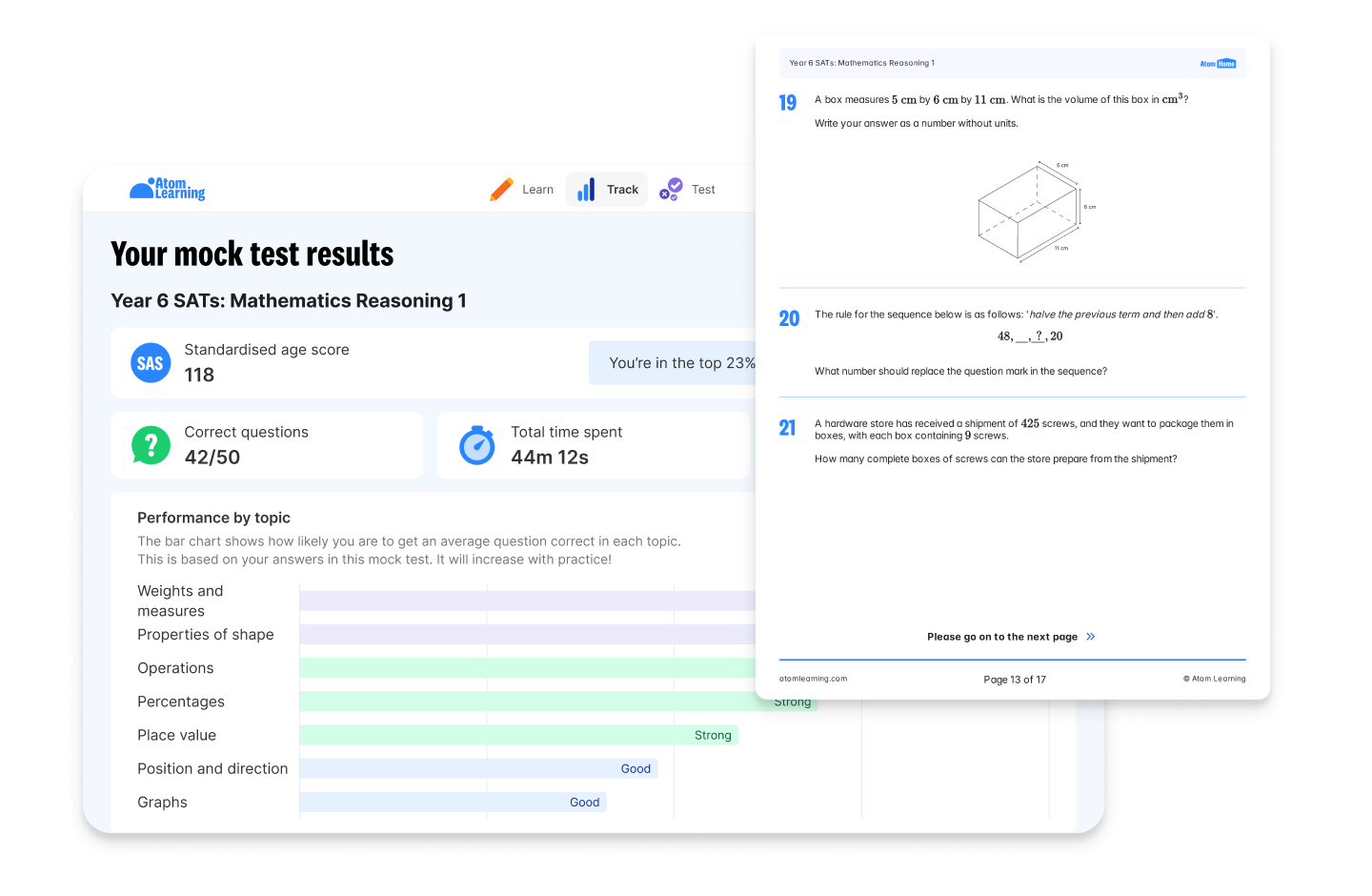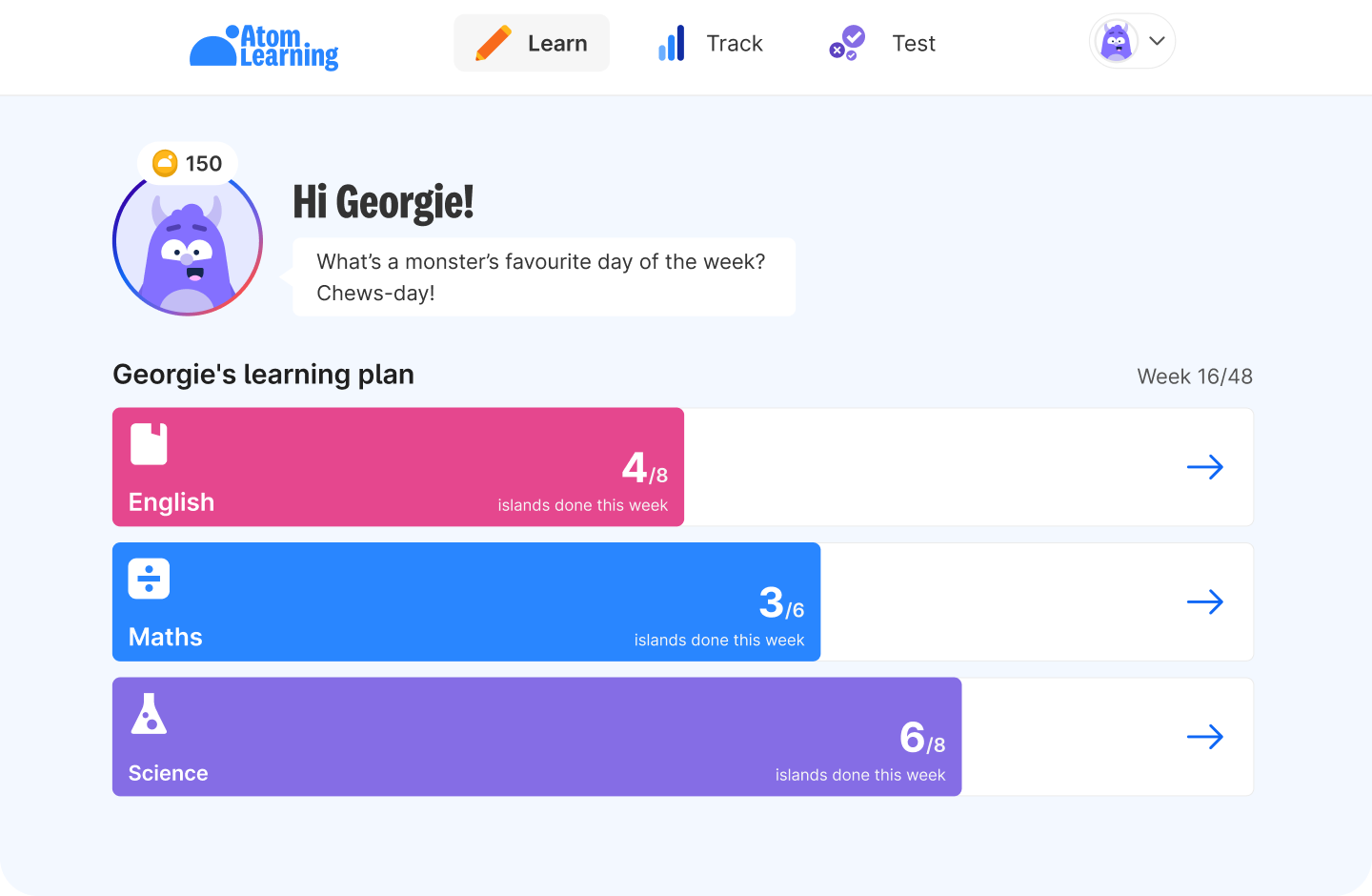5 revision techniques for Key Stage 2 SATs

With just a month to go until Key Stage 2 SATs, Year 6 teachers will be returning from their Easter breaks in full exam mode, ensuring all of their students are in the best possible position to ace their tests, which begin on 9th May 2022 and finish on 12th May 2022.
Atom Learning are here to support teachers in maximising outcomes, so we’ve come up with five tried and tested revision techniques along with a downloadable revision calendar to make sure you’re prepared for the coming weeks.
1. Tackling difficult topics early
The optimum time to tackle the tricky topics across English, maths and science is first thing in the morning.
Studies suggest that children are most likely to engage with the curriculum at the start of the day and this marks the perfect opportunity to address the questions which have been a sticking point throughout the academic year.
With the challenging content finished before break-time, students can then set to work on topics which are within their comfort zone, inspiring confidence to continue for the rest of the school day.
2. Learning gap groups
Gaps in learning come in all shapes and sizes even this close to Key Stage 2 SATs.
Whether it's adverbs or perimeter, learners will have areas of the curriculum which they still cannot quite master.
Identify areas for improvement within your class and divide them into smaller groups where they can explore misunderstandings together. Not only can this inspire confidence that they are not the only ones who don’t quite ‘get it', you can offer them the opportunity to become subject experts by creating a presentation or mind map to document all of their findings.
Why not turn this into a round-robin activity too? Have your groups rotate and leave one of the pupils from the previous group in place to explain their discoveries.
If you’re not already using Atom Prime, our subtopic breakdown gives you a detailed insight into how each of your students is performing around a given subject area.
To prepare your next cohort for Key Stage 2 SATs with Atom Prime, book an introductory call today.
3. Create a revision timetable
While revision time in the classroom is crucial, this needs to be supplemented with extracurricular work.
Have your pupils create a personalised revision timetable for the coming month before Key Stage 2 SATs. Allow them to personalise with activities such as ‘walk the dog’ or ‘play Minecraft' as reward breaks and provide a consistent and healthy approach to study outside the classroom.
Many of your students will have been revising for weeks if not months beforehand but, for those who struggle, this structure could make all the difference.
We've provided a helpful revision calendar for students to fill in. Click the image below to download for your class today.
4. Less is more
The typical engagement span of a primary school student is 30 minutes or less. With that in mind, one of our key tips during revision season is to not overwhelm with lengthy and detailed sessions.
Set a classroom timer and try to ensure that, when that 30 minute is up, you and your students take a well-earned break.
This could take any form. Watch a short episode of a series on Youtube, take the class outside for a quick runaround or just allow them a short chat with their friends to reset before the next 30-minute session. Alternatively, you could continue the learning with one of the useful revision games that Atom recommends…
5. Revision games
Revision games are a great way to deepen understanding and engage a class simultaneously. Why not try some of these out in your classroom:
Be the teacher - Many students love playing teacher. Use this technique (alongside register taking and asking their classmates to be quiet) to promote students articulating their understanding of a particular subject. With five or ten minute slots, the children can cement their own knowledge while providing valuable insight to the rest of the class.
Getting quizzical - Quizzes are a great way to motivate while revising important concepts before Key Stage 2 SATs. Have your students take the lead by creating a quiz of their own with the answers on the back of the sheet. Get your students to swap their quiz sheets with a neighbour and, once completed, they can discuss the correct answers together.
Make a mnemonic - Big Elephants Can Always Understand Small Elephants. There’s a reason that many of us will never forget how to spell the word because. Using mnemonic devices can be a really great way for students to understand the order of an operation or process. Much like getting a song or movie quote stuck in your head, mnemonics often work in a similar fashion. Take this example of the solar system for example:
My (Mercury) Very (Venus) Easy (Earth) Method (Mars) Just (Jupiter) Speeds (Saturn) Up (Uranus) Nothing (Neptune)
Using this technique and encouraging your students to use the phrase around the classroom can support learning in a way that reading from a whiteboard or copying from a textbook does not.
From everyone at Atom, good luck with all your Key Stage 2 SATs preparation!
Make SATs preparation clear and manageable.

Worried about how ready your child is for Year 6 SATs? With so much content covered across Key Stage 2, it can be difficult to know where they’re secure and where they need to improve. Atom breaks preparation into simple, weekly steps, so they build confidence in every subject without feeling overwhelmed.
- Follow personalised weekly exam plans that focus on the exact skills assessed in English and maths SATs.
- Build exam technique with SATs practice papers that mirror real question formats and timing.
- Track progress with clear topic-level insights, so you can spot gaps early and support improvement long before assessment week.
Start your free trial and help your child feel ready, confident and prepared for SATs.
